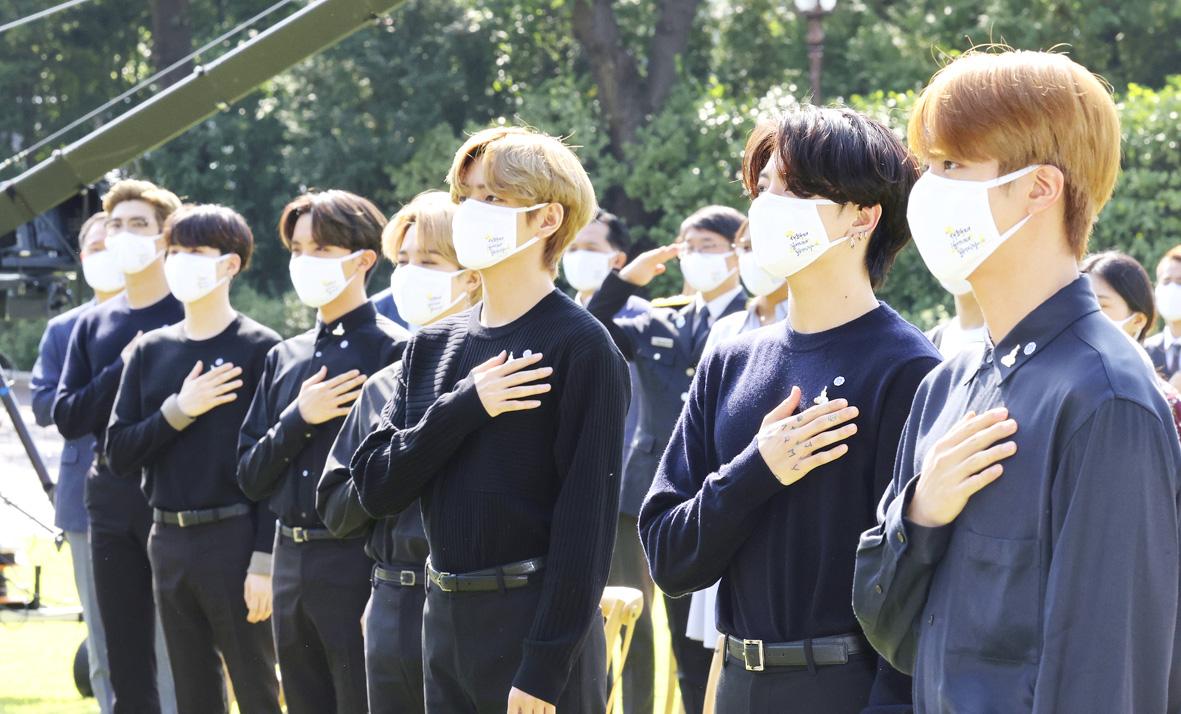Calls are mounting within South Korea for members of megaband BTS to be granted alternatives or delays to mandatory military service, with some lawmakers and fans arguing they are doing plenty for their country without wearing a soldier’s uniform.
By law, all able-bodied men in South Korea aged between 18 and 28 must serve in the military for roughly two years as part of the country’s defences against North Korea.
The eldest member of the band, Jin, is 27 and will be required to sign up by the end of next year while the other six will reach the age of conscription over the next few years.

photo: AP
South Korea has granted exemptions for high-profile athletes such as Tottenham Hotspur forward Son Heung-min as well as classical musicians such as award-winning pianist Seong-Jin Cho, but to date there have been none for K-pop stars.
“Not everyone has to take up a rifle to serve the country,” Noh Woong-rae, a senior member of the ruling Democratic Party, told a party meeting on Monday in comments that received widespread media coverage.
Noh suggested BTS members could work as ambassadors in their overseas travels to promote a group of islets at the centre of a territorial dispute with Japan.
His comments follow a proposal by fellow party member Jeon Yong-gi last month to revise the law so that some K-pop stars could delay their service until the age of 30.
“For the sake of the fairness we are not talking about exempting them from their duty, but pop musicians and artists like BTS — their careers can blossom in their twenties,” Jeon, who has the backing of a dozen lawmakers, said. “We cannot let military duty block their way at the height of their careers,” he said.
The public also appears to support special treatment for the band which has just become the first South Korean group to reach No.1 on the US Billboard Hot 100 singles chart and has a massive global fan base.
Respondents to a Sept. 21 survey by domestic news Web site Kuki News showed 31.3 percent believed the band should not have to do their military service, while another 28.6 percent supported a postponement. Those supporting normal military service were around 30.5 percent.
Their label, Big Hit Entertainment, declined to comment on the matter, while individual members have previously said they are willing to complete their service.
“Military service is the natural duty and when duty calls, I will respond any time,” Jin told a news conference in February.
Big Hit, which plans to list on Thursday next week, has said in its IPO prospectus that military service is a key risk for investors.
That has not stopped investors jumping on the offering, however, with orders from retail investors totalling some 58.4 trillion won (US$50.3 billion), some 607 times the value of shares on offer, lead arranger NH Investment & Securities said yesterday.

Under pressure, President William Lai (賴清德) has enacted his first cabinet reshuffle. Whether it will be enough to staunch the bleeding remains to be seen. Cabinet members in the Executive Yuan almost always end up as sacrificial lambs, especially those appointed early in a president’s term. When presidents are under pressure, the cabinet is reshuffled. This is not unique to any party or president; this is the custom. This is the case in many democracies, especially parliamentary ones. In Taiwan, constitutionally the president presides over the heads of the five branches of government, each of which is confusingly translated as “president”

Sept. 1 to Sept. 7 In 1899, Kozaburo Hirai became the first documented Japanese to wed a Taiwanese under colonial rule. The soldier was partly motivated by the government’s policy of assimilating the Taiwanese population through intermarriage. While his friends and family disapproved and even mocked him, the marriage endured. By 1930, when his story appeared in Tales of Virtuous Deeds in Taiwan, Hirai had settled in his wife’s rural Changhua hometown, farming the land and integrating into local society. Similarly, Aiko Fujii, who married into the prominent Wufeng Lin Family (霧峰林家) in 1927, quickly learned Hoklo (commonly known as Taiwanese) and

The Venice Film Festival kicked off with the world premiere of Paolo Sorrentino’s La Grazia Wednesday night on the Lido. The opening ceremony of the festival also saw Francis Ford Coppola presenting filmmaker Werner Herzog with a lifetime achievement prize. The 82nd edition of the glamorous international film festival is playing host to many Hollywood stars, including George Clooney, Julia Roberts and Dwayne Johnson, and famed auteurs, from Guillermo del Toro to Kathryn Bigelow, who all have films debuting over the next 10 days. The conflict in Gaza has also already been an everpresent topic both outside the festival’s walls, where

The low voter turnout for the referendum on Aug. 23 shows that many Taiwanese are apathetic about nuclear energy, but there are long-term energy stakes involved that the public needs to grasp Taiwan faces an energy trilemma: soaring AI-driven demand, pressure to cut carbon and reliance on fragile fuel imports. But the nuclear referendum on Aug. 23 showed how little this registered with voters, many of whom neither see the long game nor grasp the stakes. Volunteer referendum worker Vivian Chen (陳薇安) put it bluntly: “I’ve seen many people asking what they’re voting for when they arrive to vote. They cast their vote without even doing any research.” Imagine Taiwanese voters invited to a poker table. The bet looked simple — yes or no — yet most never showed. More than two-thirds of those